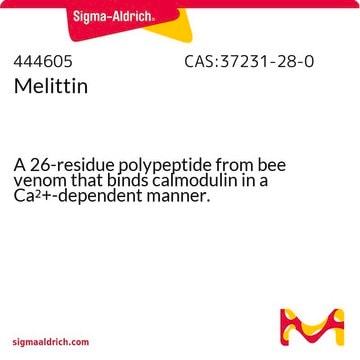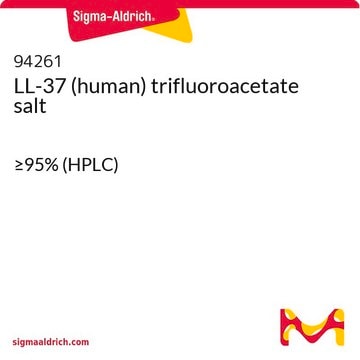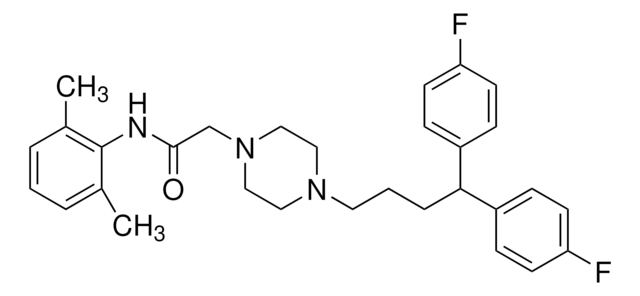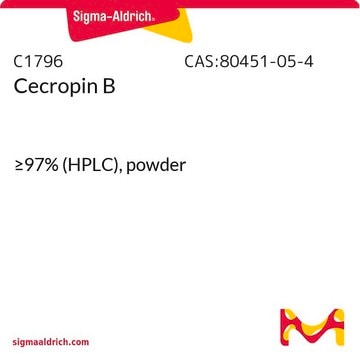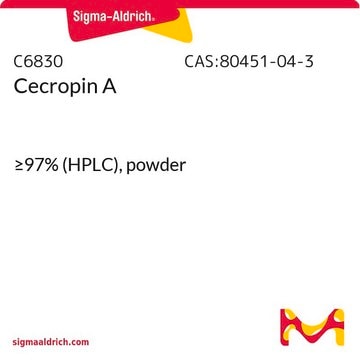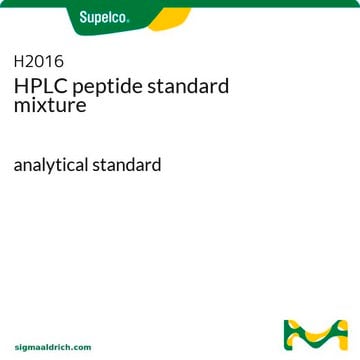M4171
Melittin
≥97% (HPLC), synthetic
About This Item
Productos recomendados
Nivel de calidad
Análisis
≥97% (HPLC)
temp. de almacenamiento
−20°C
cadena SMILES
CC[C@H](C)[C@H](NC(=O)CN)C(=O)NCC(=O)N[C@@H](C)C(=O)N[C@@H](C(C)C)C(=O)N[C@@H](CC(C)C)C(=O)N[C@@H](CCCCN)C(=O)N[C@@H](C(C)C)C(=O)N[C@@H](CC(C)C)C(=O)N[C@@H]([C@@H](C)O)C(=O)N[C@@H]([C@@H](C)O)C(=O)NCC(=O)N[C@@H](CC(C)C)C(=O)N1CCC[C@H]1C(=O)N[C@@H](C)C(=O)N[C@@H](CC(C)C)C(=O)N[C@@H]([C@@H](C)CC)C(=O)N[C@@H](CO)C(=O)N[C@@H](Cc2c[nH]c3ccccc23)C(=O)N[C@@H]([C@@H](C)CC)C(=O)N[C@@H](CCCCN)C(=O)N[C@@H](CCCNC(N)=N)C(=O)N[C@@H](CCCCN)C(=O)N[C@@H](CCCNC(N)=N)C(=O)N[C@@H](CCC(N)=O)C(=O)N[C@@H](CCC(N)=O)C(N)=O
InChI
1S/C131H229N39O31/c1-23-71(16)102(163-97(176)60-135)122(194)146-62-98(177)148-74(19)109(181)164-100(69(12)13)124(196)160-88(55-65(4)5)116(188)155-84(41-30-33-51-134)115(187)165-101(70(14)15)125(197)161-90(57-67(8)9)118(190)168-106(77(22)173)128(200)169-105(76(21)172)123(195)147-63-99(178)150-92(58-68(10)11)129(201)170-54-36-44-94(170)121(193)149-75(20)108(180)158-89(56-66(6)7)117(189)166-104(73(18)25-3)127(199)162-93(64-171)120(192)159-91(59-78-61-145-80-38-27-26-37-79(78)80)119(191)167-103(72(17)24-2)126(198)157-83(40-29-32-50-133)111(183)154-85(42-34-52-143-130(139)140)112(184)152-82(39-28-31-49-132)110(182)153-86(43-35-53-144-131(141)142)113(185)156-87(46-48-96(137)175)114(186)151-81(107(138)179)45-47-95(136)174/h26-27,37-38,61,65-77,81-94,100-106,145,171-173H,23-25,28-36,39-60,62-64,132-135H2,1-22H3,(H2,136,174)(H2,137,175)(H2,138,179)(H,146,194)(H,147,195)(H,148,177)(H,149,193)(H,150,178)(H,151,186)(H,152,184)(H,153,182)(H,154,183)(H,155,188)(H,156,185)(H,157,198)(H,158,180)(H,159,192)(H,160,196)(H,161,197)(H,162,199)(H,163,176)(H,164,181)(H,165,187)(H,166,189)(H,167,191)(H,168,190)(H,169,200)(H4,139,140,143)(H4,141,142,144)/t71-,72-,73-,74-,75-,76+,77+,81-,82-,83-,84-,85-,86-,87-,88-,89-,90-,91-,92-,93-,94-,100-,101-,102-,103-,104-,105-,106-/m0/s1
Clave InChI
VDXZNPDIRNWWCW-JFTDCZMZSA-N
Información sobre el gen
human ... ATP1A1(476) , CALM1(801)
mouse ... ATP1A1(11928) , CALM1(12313)
rat ... ATP1A1(24211) , CALM1(24242)
Amino Acid Sequence
Descripción general
Aplicación
Acciones bioquímicas o fisiológicas
Otras notas
Palabra de señalización
Danger
Frases de peligro
Consejos de prudencia
Clasificaciones de peligro
Acute Tox. 3 Dermal - Acute Tox. 3 Oral
Código de clase de almacenamiento
6.1C - Combustible acute toxic Cat.3 / toxic compounds or compounds which causing chronic effects
Clase de riesgo para el agua (WGK)
WGK 3
Punto de inflamabilidad (°F)
Not applicable
Punto de inflamabilidad (°C)
Not applicable
Equipo de protección personal
Eyeshields, Faceshields, Gloves, type P2 (EN 143) respirator cartridges
Certificados de análisis (COA)
Busque Certificados de análisis (COA) introduciendo el número de lote del producto. Los números de lote se encuentran en la etiqueta del producto después de las palabras «Lot» o «Batch»
¿Ya tiene este producto?
Encuentre la documentación para los productos que ha comprado recientemente en la Biblioteca de documentos.
Los clientes también vieron
Nuestro equipo de científicos tiene experiencia en todas las áreas de investigación: Ciencias de la vida, Ciencia de los materiales, Síntesis química, Cromatografía, Analítica y muchas otras.
Póngase en contacto con el Servicio técnico
